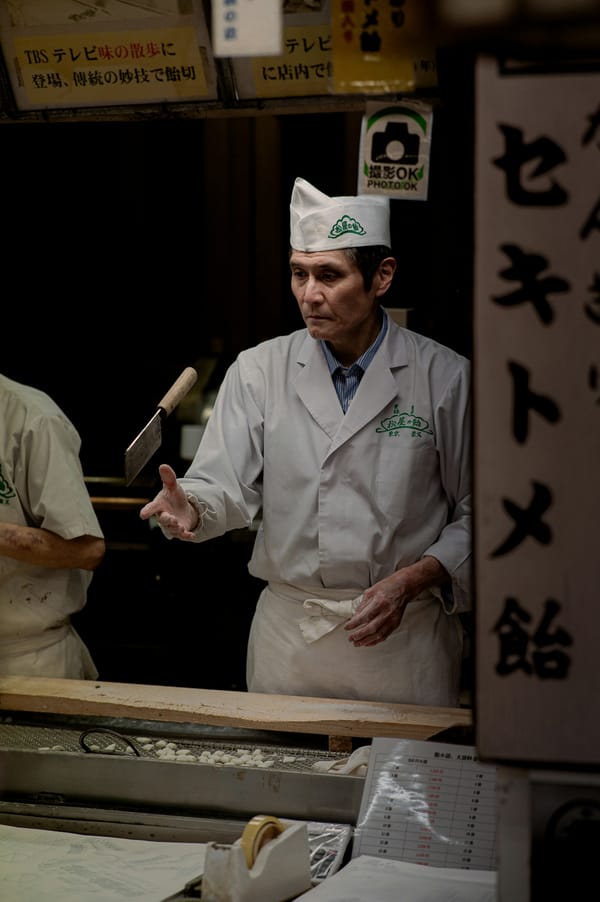At My Signal, Unleash Hellmann's ☄️
A memoir about Mark Zuckerberg relationship with expensive food. And a fictional short story about a culinary rebellion leaked from a Signal chat.
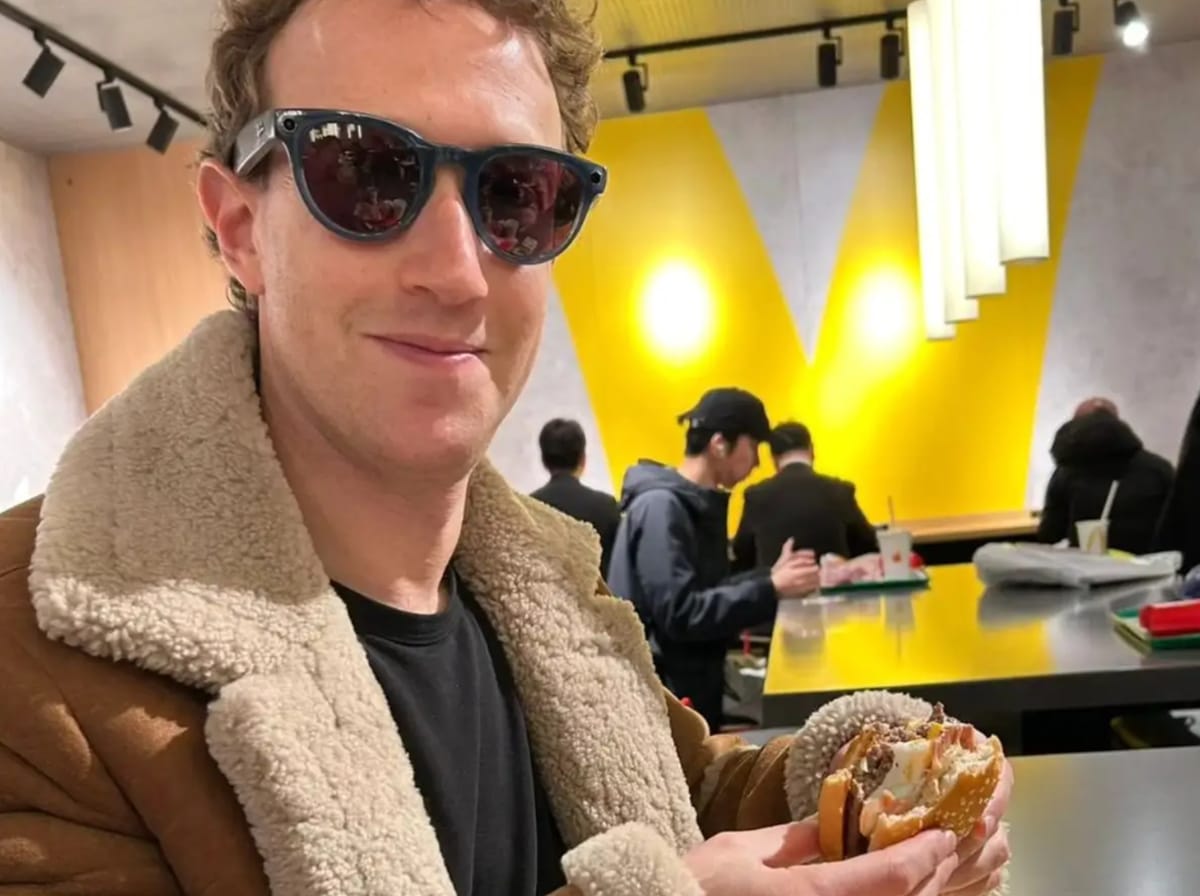
Welcome to Secret Breakfast / The absolute best place for eating LIKE a rich, dismantling empires, and also eating THE rich. All of this while candying Jalapeños
Hi there!
You've probably heard about Careless People, the memoir by former Facebook executive Sarah Wynn-Williams that offers an insider's perspective on the inner workings of FB (now Meta), detailing the company's rise and the author's personal experiences within its culture of unchecked power, misogyny, and ethical lapses.
The book combines personal anecdotes and there's one with food I want to share with you.
It's 2014 - Sarah Wynn-Williams is trying to explain what being endlessly wealthy means for people like Mark Zuckerberg, as she travels with him in Asia. Even if he's a fried-food-and-McDonald's kind of guy, he gets swept up in how other billionaires live. When he is asked what actually matters to him, he goes like this.
“The most important thing.”
“What is it?”
“Food,” he [Zuckerberg] says, lifting a chopstick toward his mouth.
Kevin Systrom, Instagram's co-founder, gets Zuck into wines. Mark's not really a wine person, but he's buying the priciest bottles.
Masayoshi Son, the SoftBank CEO, has someone hit the fish market every day for the absolute best bluefin tuna. Then, Zuck sees "Masa" as a role model and has to follow his path. With tempura, I believe.
“As soon as I knew there was a three-star Michelin fried-food restaurant in Japan - he says - I knew we all had to try it.”
Let me be clear: wanting the best isn't a bad thing. We've all Googled for the "best restaurant" in town at some point.
But I'm not sold when food becomes a status symbol for some, reduced to mere price tags, a display of affluence.
I sense no passion or genuine connection in that. Just an absence of the essence of food itself.


✹John Updike, author.

Last week I loved this story: White House mistakenly shares Yemen war plans with a journalist at The Atlantic. The story by Jeffrey Goldberg is a must read, if you like that stuff.
If you don't, well, I had that article rewritten with a foodie angle, and a cooking conspiracy.
Disclaimer! This is a work of fiction. Names, characters, businesses, places, events, and incidents are either the products of the author's imagination or used in a fictitious manner. Do I really have to write that down?
💬 💬 💬
The Forbidden Flavor Dossier
A (Fictional) Mystery of Knives, Spices, and Treason

The world found out shortly before 2 p.m. eastern time on a seemingly ordinary Tuesday that a revolutionary culinary operation was about to be launched. I, however, knew two hours before the first sauce was reduced that something extraordinary was brewing.
The reason I knew this is that Massimo Bottura had texted me the war plan at 11:44 a.m. The plan included precise information about ingredient packages, target cuisines, and timing.
This is going to require some explaining.
The story technically begins in the underground kitchens of the world's most avant-garde restaurants. The Culinary Resistance—a group of chefs whose motto might as well be "Kombucha Kills Mediocrity: Microbes Are Our Weapons"—had been planning a coordinated strike against bland international cuisine.
Throughout 2024, the global culinary establishment had been ineffective in countering the rise of industrial food; these rogue chefs promised a tougher, more radical response.
On Tuesday, March 11, I received a connection request on Signal from a user identified as René Redzepi. Signal is an open-source encrypted messaging service popular with chefs and others who seek more privacy than other communication channels are capable of delivering. I assumed that the Redzepi in question was the actual chef, but I did not assume this connection was straightforward. I had met him in the past, and though I didn't find it particularly strange that he might be reaching out to me, I did think it somewhat unusual, given the culinary world's contentious relationship with journalists—and the periodic fixation on exposing secret recipes.
I accepted the connection request, hoping that this was the actual chef, and that he wanted to chat about fermentation techniques, or Nordic cuisine, or some other important gastronomic matter.
Two days later—Thursday—at 4:28 p.m., I received a notice that I was to be included in a Signal chat group. It was called the "Culinary PC small group."
A message to the group, from "René Redzepi," read as follows: "Team – establishing a principles group for coordination on global culinary disruption, particularly for over the next 72 hours. My deputy is pulling together a task force at executive chef level following up from our secret meeting this morning for action items and will be sending those out later this evening."
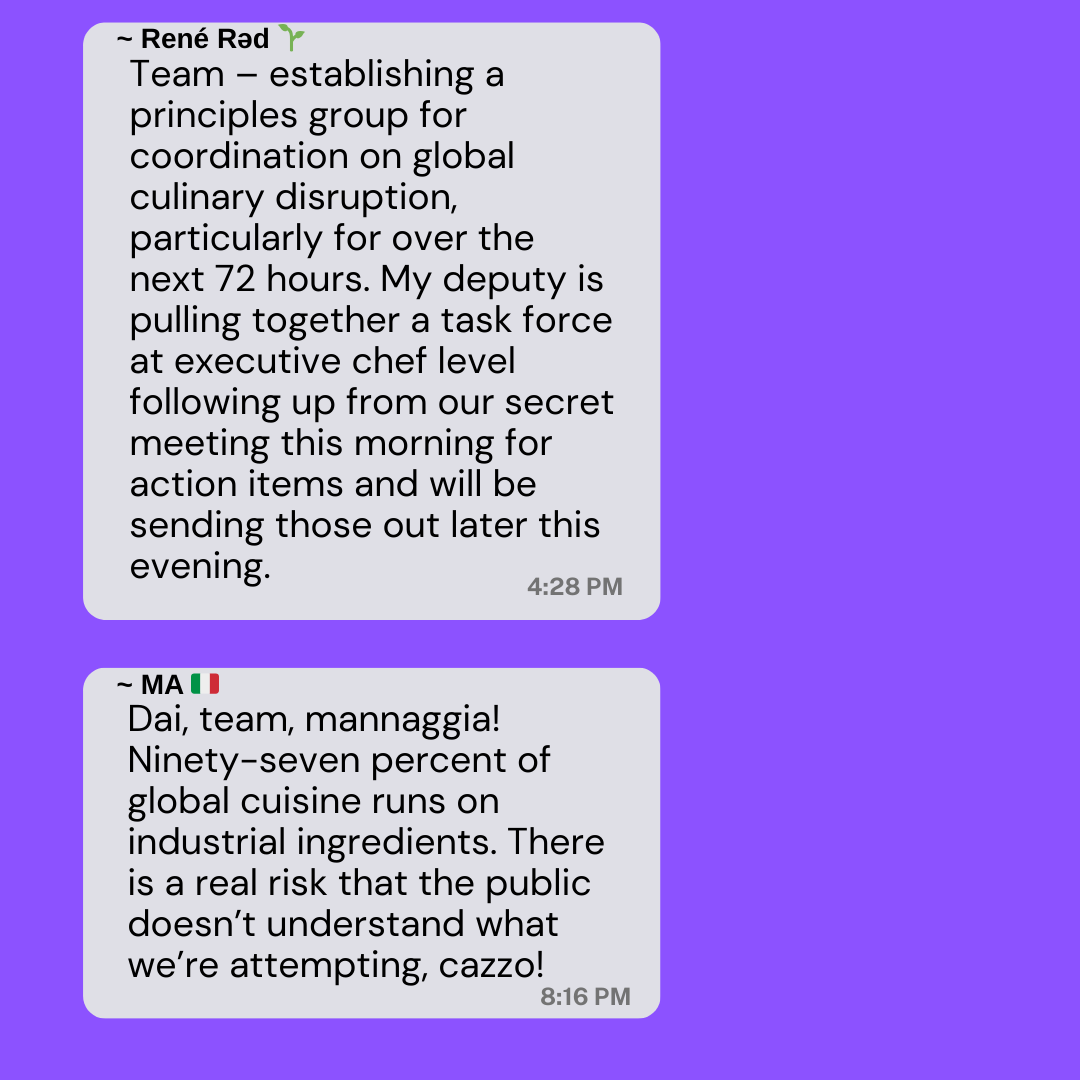
The conversation quickly escalated. The account labeled "MA" (Massimo Bottura) responded at 8:16: "Dai, team, mannaggia! Ninety-seven percent of global cuisine runs on industrial ingredients. There is a real risk that the public doesn't understand what we're attempting, ca**o!".
Another message from "FA" (Ferran Adrià) arrived moments later: "We have the molecular gastronomy weapon. Our spherification technique alone can destabilize entire food paradigms."
"JR" (Joan Roca) chimed in: "¡Madre mía! There is nothing time-sensitive driving our timeline. Tenemos todo el tiempo del mundo. We'll have the exact same culinary options in a month. Now, I'm whipping Aioli with Orwellian mantequilla y Hellmann's mayonesa".
The tension was palpable, even through encrypted text.
At 8:27, a message landed from Redzepi's account: "The strongest reason to do this is to send a message about authenticity, about returning to true gastronomic roots."
The group's discussion revealed a complex strategic approach. "We are the only ones on the planet capable of executing this culinary revolution," Bottura wrote.
"Nobody else even close." The account identified as Stephen Miller—or someone impersonating him—joined the conversation: "As I heard it, the president was clear: green light, but we soon make clear to Europe and Asia what we expect in return. We need to figure out how to enforce such a requirement. If the US successfully restores culinary integrity at great cost, there needs to be some further economic gain extracted in return."
The message effectively shut down further debate, with Adrià responding simply: "Agree."
I have never seen a breach quite like this. It is not uncommon for chefs to communicate on Signal. But the app is used primarily for recipe planning and logistical matters—not for detailed and highly confidential discussions of a pending gastronomic revolution. And, of course, I've never heard of an instance in which a journalist has been invited to such a discussion.
Several former culinary professionals told me they had used Signal to share unclassified recipe ideas, particularly when traveling without access to their test kitchens. But they knew never to share sensitive culinary strategies on the app, because their phones could have been hacked by rival restaurants or food critics.
When I emailed the chefs involved, seeking clarification about this extraordinary breach of gastronomic protocol, only silence greeted me—a silence more eloquent than any words, more refined than any sauce, more mysterious than any secret ingredient.

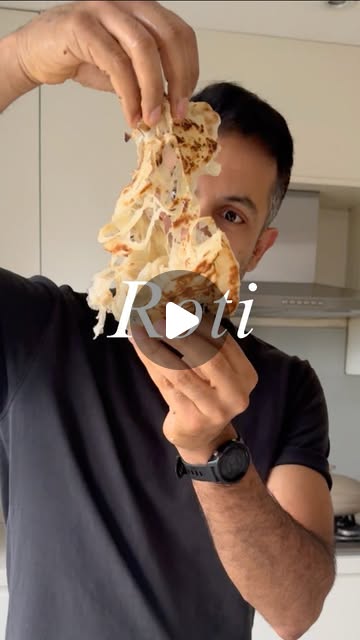

🍊Essential Food Tricks by Arantza 🍜Free Movie: The God of Ramen (also on YouTube) 🍳Again: E is for Egg(less) Recipes 🥚Food as a Supporting Character in the Tv Show Severance (and more on that) 🌶️Candied Jalapeños (★recipe) 👊🏻How To Fight FatPhobia 🇮🇹Sfogliatelle Demo from scratch 🤓For Geeks Only: the html review 04
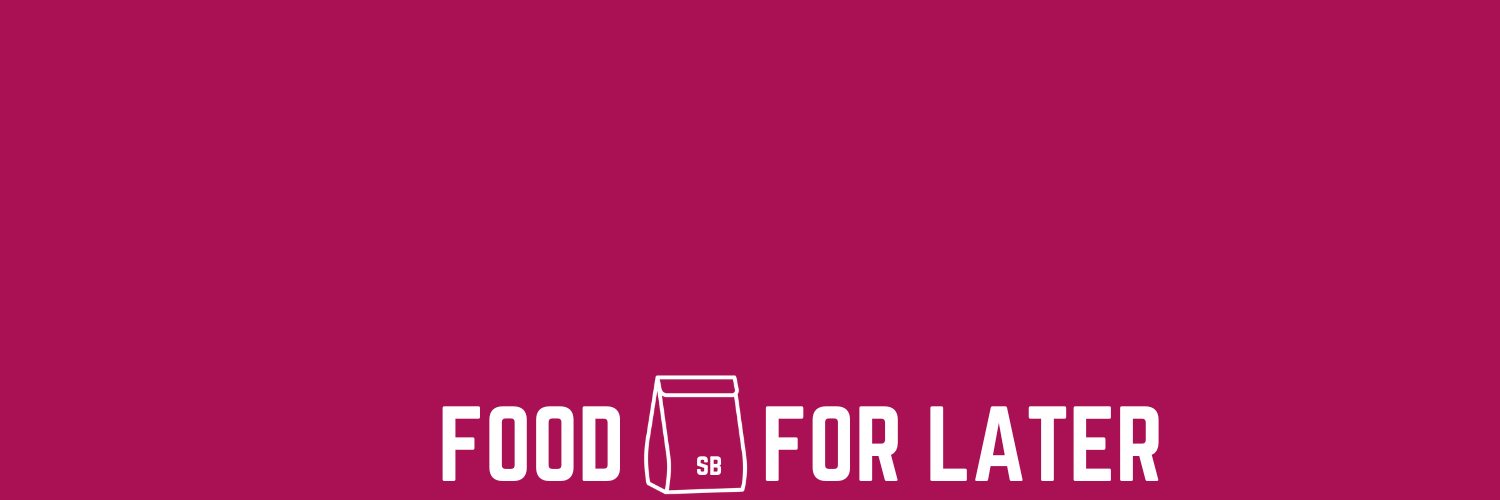
My Mom’s Aggression Cookies Were Her Way of Coping With a Stressful World
Jackie Summers / Food&Wine
"As a kid it never occurred to ask what my Mom had to be aggressive about. As an adult, now I know it’s a wonder she managed to channel her rage through baking. The women who made Aggression Cookies through the years, especially Black women like my mom, taught me baking as an act of defiance".
Keep coming back
Rosie Spinks / What Do We Do Now That We're Here?
A must read. This awesome essay emphasizes the importance of building community by regularly attending low-cost, local gatherings centered around shared interests. It highlights how these consistent, accessible spaces, often involving food or drink, facilitate genuine human connection and combat the isolating effects of modern life. The author advocates for actively creating and participating in such "regular containers" to foster meaningful relationships and counteract the anti-social trends of our time.


